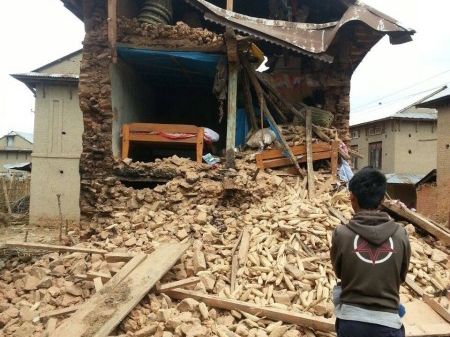David Harris

Federation System Responds to Nepal Crisis Immediately after Earthquake
Here is the most recent update (May 4) from the Jewish Federations of North America on the crisis in Nepal. — Danielle
The death toll following April 25’s devastating 7.8 magnitude earthquake in Nepal has risen to over 7,000; tens of thousands are homeless. According to the United Nations, the death toll is likely to rise to the tens of thousands in Nepal, India, and China. Approximately 2,000 Israelis were in Nepal when the earthquake happened.
Federations have already swung into action and are collecting funds for emergency relief efforts (click here to contribute). We are working closely with our partners who are focused on assessing the unfolding situation on the ground to identify how we can best ensure survivors’ immediate needs are addressed.
Due to impassable roads and landslides, rescue teams are struggling to reach those in need. Nepal’s poor road network and the limited number of helicopters are also hampering rescue efforts and the distribution of aid.
Needs are expected to rise dramatically as reliable sources of food, water and medical supplies are depleted. Continued aftershocks spread fear and uncertainty. Kathmandu airport is struggling to efficiently manage the influx of aid flights. A number of Jewish organizations are on the ground in Nepal.
It’s at times like this that our shared commitment to tikkun olam, repairing the world, finds its deepest expression. In the past, Federations have worked through our partners to provide immediate relief and long-term assistance to victims of natural and man-made disasters around the globe, including the Philippines, Haiti, Japan, and South Asia after the Indian Ocean Tsunami, and continue to operate programs designed to rebuild infrastructure and community life in disaster-stricken regions.
JDC (Joint Distribution Committee), our trusted partner, is actively assessing the situation and working to provide support where it is needed most. Annual Campaign dollars are allocated to JDC each year to support Jewish communities worldwide. Here is what they are doing:
- JDC is working with Tevel b’Tzedek to meet immediate needs, including emergency shelter, cash assistance, temporary learning spaces and other community-based support programs for women and children. JDC’s team is coordinating closely with Tevel b’Tzedek’s Nepalese and Israeli staff and volunteers on the ground, who match JDC’s emergency response expertise with their deep knowledge of development issues and communities in Nepal.
- Working together with the Afya Foundation, JDC is transporting medical and shelter supplies to Nepal to support hospitals and health care providers. The Consulate General of Nepal in New York is helping to facilitate and accelerate the shipping process, and the first recipients will be the orthopedic surgery departments at Grande International Hospital and Lake City Hospital.
- JDC is partnering with Heart to Heart International to provide medications, and will send emergency medical teams into periphery areas once road access is secured.
- JDC is supporting Magen David Adom medical assistance work coordinated with the Nepalese Red Cross.
- Our partners continue to work with UNICEF to provide emergency supplies for children and respond to needs for shelter, nutrition, water and sanitation.
Through JDC, Federations have provided immediate relief and long-term assistance to victims of natural and man-made disasters around the globe, including the Philippines, Haiti, Japan, and South Asia following the 2004 Indian Ocean tsunami, and continue to operate programs designed to rebuild infrastructure and community life in disaster-stricken regions.
Israel sent an Israel Defense Forces delegation to conduct search and rescue operations. It has also established a fully functioning field hospital including operating rooms, X-ray equipment and pediatric care. Here are additional updates on Israeli efforts:
- Following landing delays at the Kathmandu airport, an IDF C-130J aircraft departed Israel Monday morning, April 27, carrying 90 rescue personnel and equipment.
- An El Al 747 aircraft and a second IDF transport plane left Monday afternoon, Israel time, to Kathmandu with some additional 170 rescue and medical staff and 90 tons of medical supplies including a mobile field hospital. A total of five Israeli planes will land today, bringing much-needed supplies and trained personnel to assist with the rescue efforts.
- Fifty Israeli hikers were evacuated by helicopter from the Langtang region to Kathmandu. In addition, 10 Israeli trekkers were evacuated from the Everest region. Approximately 11 Israelis are still considered “out of contact.” Many Israelis are trapped in the mountains along hiking routes. The Israeli government is working to reach them, an effort complicated by Nepal’s nationalizing of all helicopters.
- On Sunday evening, April 26, three premature babies born to surrogate mothers for Israeli couples, along with their parents and an injured Israeli man, arrived in Israel aboard an IDF plane. More than 200 Israeli travelers later returned safely to Israel on board the El Al 747 that transported an IDF delegation.
- Two more IDF planes filled with rescue and medical supplies departed for Nepal on Tuesday, April 28.
- The Israeli Ministry of Foreign Affairs and Israeli insurance companies are working to rent helicopters for rescue operations.
Chabad of Nepal has been a staple for Jewish travelers looking to connect with Judaism. It is also participating in relief efforts on the ground in Nepal.
- Chabad continues to remain an anchor point for Israeli and Jewish travelers in Nepal.
- Chabad is working to identify and locate missing Israelis and reach those in need of assistance.
- Magen David Adom established a first aid station at the Chabad House in Kathmandu.Chabad continues to remain an anchor-point for Israeli and Jewish travelers.


